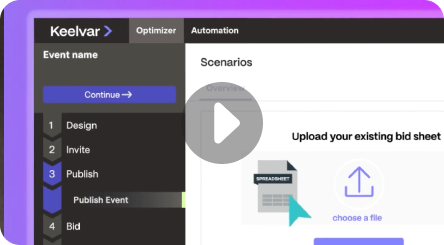The best sports teams in rugby, NFL, soccer and other sports know that controlled aggression is the key to success. Running onto a pitch in a fury usually ends in red cards or premature exhaustion and ultimately loss. Recently, in the ocean freight transportation category, shippers had inventory marooned on vessels with no port willing to accept delivery because the steam ship line was bankrupt. The small gains made in pushing transport providers over the edge in aggressive auctions were dwarfed by the losses in inventory and unfulfilled orders. Controlling bid aggression is an essential element for risk management and sourcing managers need to weigh up such risks against potential cost savings.Controlling aggression among suppliers in a competitive bidding environment is an similarly important objective for a number of reasons. Firstly, risk management demands that long-term negative consequences of loss-making supply contracts usually outweigh short term gains.
Bidders can lose their sense of discipline in eAuctions and engage in a win-at-all-costs strategy. Whilst this is often a cause for celebration on the purchaser side and seen as a windfall gain, it is not without its drawbacks. The risks of winner’s regret and failures in subsequent service levels are elevated. A more controlled mechanism for exerting price pressure via communication of sustainable cost-reducing improvements in efficiency is more appropriate in circumstances where long-term supplier relations and quality of service are important. Secondly, the best suppliers know when to walk away from overly-competitive environments. Sales teams that take a long-term strategic view know that profit margins are more important than revenue so they tend to be more selective about which competitions to win and which they should choose to lose. They may also feel a sense of betrayal if a buying organization strives to strip away all margins so if the lowest cost option fails, then they make seek some vengeance if requested to ameliorate a failed supply situation.
As an eSourcing vendor, Keelvar has an onus to support responsible auction designs and there are levers for doing so. When proponents of eAuctions extol their ability to induce bidding wars, they are indirectly encouraging buying teams to invite elevated supply chain risks. Switching from a continuous auction to a multi-round combinatorial RFQ is one of the most effect mechanisms for a more constructive bid process that provides feedback at the beginning of a new round. This can be fast paced with rounds of only a few minutes but it also gives buyers an opportunity to apply constraints on the tentative award scenario. So if a bidder is behaving hyper-aggressively, then it is possible to constrain the volume or number of Lots they are awarded. It may be irresponsible to award too much business to a supplier that appears desperate for volume. For example, if a supplier is nearing insolvency then they may aggressively acquire sales volumes that are loss-making in the long-run but offer positive cash-flow benefits that extend their solvency period but may lead to disaster. A constructive way to deal with such risks is to manage the proportion of volumes awarded. You may choose to award business with lower downside risks to smaller or more vulnerable suppliers; this can have its benefits as supporting competition can enhance long-term service levels. However, mission critical services should not invite risks.
The author, Alan Holland PhD, is the Founder of Keelvar and a former lecturer in AI, Game Theory and Optimization at University College Cork, Ireland.

.svg)















.png)
